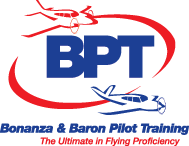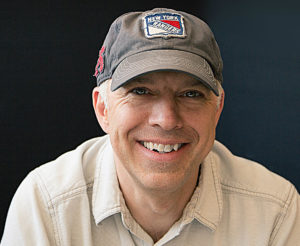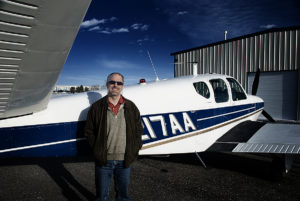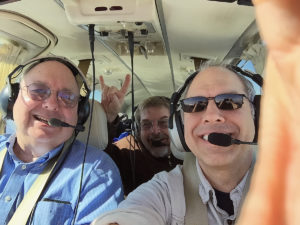Ron Zasadzinski, CFII SEL & MEL
8,000+ total time
BPT: Ron, how did you get your start in aviation?
RZ: Growing up, my dad worked for Eastern Airlines as a gate agent out of Newark Airport. I was exposed to aviation as an infant and we regularly flew Eastern for family vacations. Aviation is in my blood.
I put together my first Styrofoam model airplane when I was 3, it came in a Cheerios box! I built dozens of model airplanes – and some even flew! I also participated in Civil Air Patrol.
BPT: When and where did you learn how to fly?
RZ: I learned to fly in the 1980’s in the Bates program at Harvey Mudd College, where I earned my degree in Physics. It was a unique program run by Iris Critchell who flew in the WAFS in WWII. I helped celebrate her 100th birthday in December 2020 and she’s still going strong.
During our private pilot training we had 150 hours of ground school geared specifically toward scientists and engineers. Iris instilled in me great respect for the privilege of flight. Plus, learning to fly in the Los Angeles Basin gave me experience and confidence I still carry today.
BPT: Tell us about the aircraft you have flown over the years.
RZ: Cubs, Scouts, Aeronca Champs, Cessnas, and nearly every model of Bonanza and Baron.
BPT: And what are you flying currently?
RZ: Currently, I currently fly a 1959 K35 Bonanza that is owned by a good friend. Thank you, Gus!
BPT: Please share with us some of the highlights of your flying career.
RZ: Learning from Iris Critchell and the other incredible instructors in the Bates program. Their example informs who I am as a pilot and instructor to this day.
Chief Flight Instructor at The Pilot Center in Fort Collins, Colorado 1993-2000. I taught flying full time for 7 years.
Meeting Randy Bailey and Bill Hale, which led to my participation in BPPP and now BPT.
Having meaningful interactions with 5 astronauts. That’s been pretty special.
Getting to teach and learn alongside my BPT colleagues is an incredible privilege.
All the pilots I’ve met along the way, many of whom have become friends. It all comes down to the people.
BPT: You mentioned meeting Randy Bailey and Bill Hale. How did you become involved with BPT?
RZ: That’s a great story! While I was Chief Flight Instructor at The Pilot Center in Fort Collins Colorado, Randy Bailey came to me for one of his ratings. Through Randy, I met Bill Hale. Bill invited Randy and me to attend several clinics as flight instructors in 1997. My increasing participation continued to grow from there.
BPT: Why is BPT important to you?
RZ: Aviation safety isn’t something you learn once and then you’re done. It requires regular refreshing from multiple angles. Mentally, it’s essential to have regular reminders about how to operate safely in any environment. It’s also important to practice skills.
BPT is important to me because we have some of the most experienced Beechcraft instructors on the planet who provide the service of reminding pilots what’s important and why, in a very effective and fun format.
BPT is also important to me because I’ve learned the most I’ve ever learned about flying from my fellow BPT instructors. We regularly conduct instructor briefings in person to review situations that we’ve been through. We discuss ways we can do things better; ways we can teach better; ways we can fly more safely.
Working through decision-making for particular maneuvers, situations and real-life experiences with colleagues is powerful. The pilots who attend our seminars all benefit from this wealth of knowledge and sharing of information.
BPT: What do you believe makes BPT unique?
RZ: Most unique of all is the caliber, experience level and ability to share knowledge that all of our instructors have.
BPT: Would you recommend attending a BPT Clinic to a new pilot?
RZ: Absolutely! For new pilots, there are so many ways to fly an airplane. Our team of instructors, over decades, have found the safest and most efficient ways to operate these airplanes. The things we have worked out enable you to reduce your mental workload so your brain can pay attention to things that matter like traffic and situational awareness.
Learning how to operate your Beechcraft correctly from the beginning is so valuable! Why learn bad habits and then have to fix them? We will help you get it right the first time!
BPT: How about for more seasoned pilots. Would you recommend BPT to them, as well?
RZ: Yes! It’s all about the camaraderie. We have pilots who say they learn as much from the other pilots attending as from the classes themselves. That can’t be replicated.
Experiential learning is more effective by an order of magnitude than just online learning. Online learning has its place and offers convenience and efficiency.
Being there in person amplifies and supercharges everything. It’s like flying camp for adults. Get away for the weekend; focus on flying; talk with interesting people; share your experiences with others; and learn from each other.






